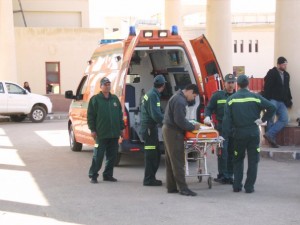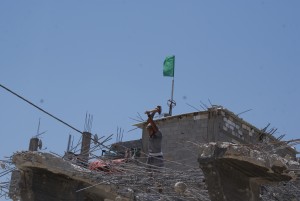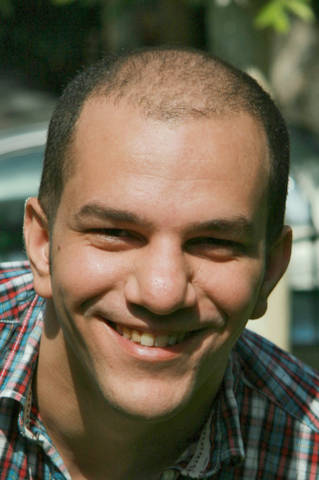People of the border in Rafah
By Osama Diab
Rafah, a city divided between Gaza and Egypt, and between war and peace, prays for the opening of the border crossing.
January 2009

The Rafah border crossing has sparked endless controversy since the start of the Israeli attacks on Gaza on December 27. Egypt's point-blank refusal to open the border is interpreted by many in the Arab world as a gesture of support for Israel's war on Gaza, mainly to weaken Hamas, which has ties to Egypt's outlawed but often tolerated Muslim Brotherhood. The visit of the Israeli Foreign Minister Tzipi Livni a few hours before the attacks confirmed, in the minds of many, the doubts that Egypt might have been notified, turning scepticism into certainty about Egypt's position on the war. Demonstrations were held outside Egyptian embassies in almost every Arab capital and many European cities.
The Egyptian government is furious at the accusations and stated that Egypt's support for the Palestinian cause is indisputable. President Hosni Mubarak says opening the crossing will deepen the divide between Gaza and the West Bank. He also described the opening of the border as an “Israeli trap”, and that once Egypt opened the crossing unconditionally, Israel would go ahead and close its borders with Gaza.
Leaving this political storm behind, I travelled to the border town of Rafah to see for myself what the people who live closest to the crossing, and the war, think about the conflict, and how it affects them. An air of gloom and doom hung over the small town. All the streets leading to the borders were blocked by the army and it seemed that the only people on the streets were there for necessity.
Under the terms of the Egyptian-Israeli peace treaty, the agreed border separated the then-Israeli occupied Gaza from Egypt by cutting the town of Rafah into two halves. However, both sides of the town still share a lot in common, and many still have extended family on the other side of the border. And with Palestinian kufiyas wrapped around most necks and people speaking a more Palestinian than Egyptian dialect, the people of Egyptian Rafah still share a lot with their Palestinian neighbours, despite the divide.
“What is happening in Gaza is a shame. I can't describe how I feel, but I always pray for my brothers in Gaza,” said Ahmed Abdel-Hamid, a shopkeeper in Egyptian Rafah. “The effect of the war on us is dire; the ground shakes under us every time Israel sends a bomb. We are afraid and we feel that death is near.”
The opening of the crossing has economic benefits and brings money into Egyptian Rafah. When Gazans destroyed part of the border wall on January 23, 2008, tens of thousands of people from the Strip flooded into Rafah and the nearby town of Arish to buy supplies that were scarce due to the siege on their city. The hole in the wall meant Gazans could buy up a couple of weeks of supplies and cash for the people of Egyptian Rafah people. It was reported that everything was sold for up to triple its normal market price.
Ayman, our driver in Rafah, described it best when he said that the government should open the border because the Gazans desperately need supplies and Rafah's people are desperate for money. Moreover, with the border open permanently, this kind of profiteering could be eliminated, enabling Gazans to get their supplies at decent prices and generating a constant stream of business for locals in Rafah.
The general fear that if the border is open, Gazans, out of desperation, will flood into Sinai and sound the death knell for the Strip. The Egyptians of Rafah and Arish disagree and believe that Gazans will get what they need and head back to their homes because they do not want to leave Palestine and their land. “Gazans are attached to their land and don't want to leave Palestine. If they had the intention to leave, they would've done so a long time ago,” argues Abdel-Hamid.
It seems that the people of the border are more relaxed than the Egyptian government about opening the crossing. They are convinced it won't have the serious consequences Cairo claims and fears. Egyptian officials may be project on the Gazans what they would do if they were in their shoes. Most would think, and no one would blame them, that it is wise to escape the violence that has already claimed more than 800 Gazan lives, but this is not necessarily how people who have fought a lifetime for their land behave.
Since opening the border can save the lives of hundreds of women and children by letting people temporarily out of the war zone and letting doctors in, and since the people who are going to be directly affected by it on the Egyptian side are actually calling for it, why not just open it up?
Egypt's position on this war is very similar to its position on the Lebanon war two years ago, when Mubarak called Hizbullah's action an “adventure”, accusing the group's leader Hassan Nasrallah of dragging his whole nation into war. History is repeating itself and Mubarak is also accusing Hamas of being adventurous and dragging Gaza into war. Blaming the war entirely on Hamas is an opinion only shared by Mubarak, Bush and Israeli politicians. It makes a lot of sense, since Egypt's leadership, the US and Israel share the same enemy, militant Islamic groups.
My argument has always been that Islamic groups are hindering political reform in Egypt because their presence is used by secular regimes as an excuse to become more oppressive. But what the United States, Egypt and Israel are doing is creating unprecedented support for these groups on the Egyptian street, which will only lead to more political complexity and turmoil. Egypt's regime should offer a viable alternative to what Hamas and Hizbullah offer, and a good move will be opening the crossing to reduce the effect of the war and siege on Gaza.
© Copyright Osama Diab. All rights reserved.
This is an archive piece that was migrated to this website from Diabolic Digest


